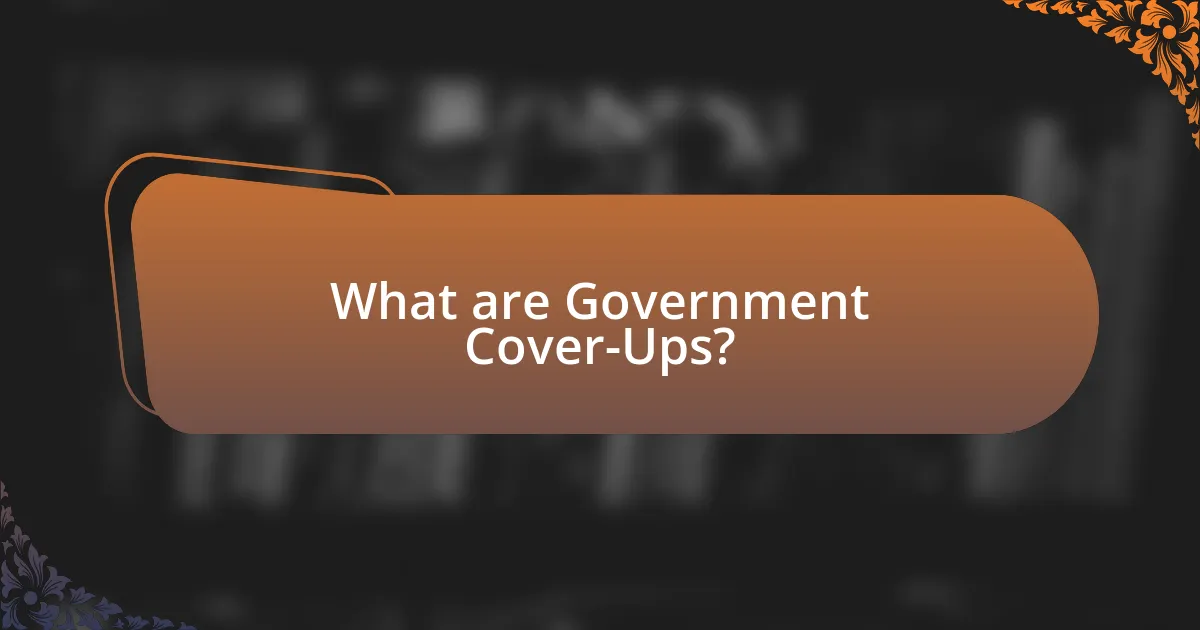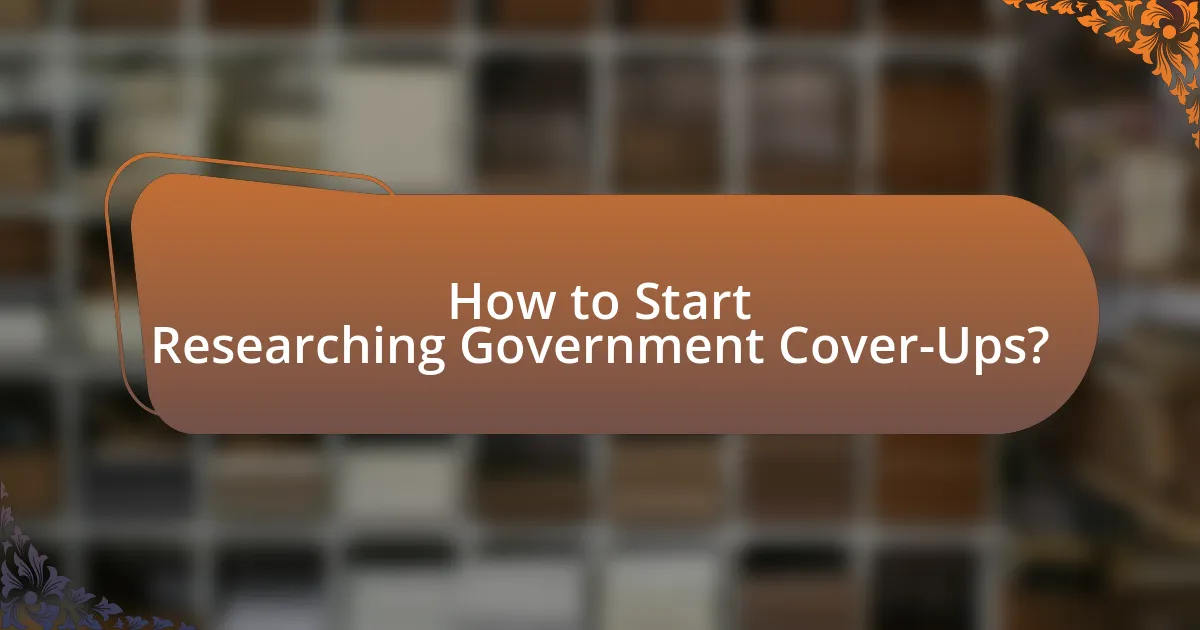Government cover-ups refer to intentional efforts by government entities to hide information or actions from the public, often linked to sensitive issues such as national security or political scandals. This article provides a comprehensive guide on researching government cover-ups, detailing historical examples like the Watergate scandal and the Tuskegee Syphilis Study. It outlines effective research strategies, including identifying credible sources, utilizing public records, and employing interviews, while also discussing the significance of these cover-ups for writers and the themes they can explore. Additionally, it offers practical tips for organizing research and writing compelling narratives about government deception.

What are Government Cover-Ups?
Government cover-ups are deliberate efforts by government entities to conceal information or actions from the public, often involving sensitive issues such as national security, political scandals, or public health crises. Historical examples include the Watergate scandal, where the Nixon administration attempted to hide its involvement in a break-in at the Democratic National Committee headquarters, and the Tuskegee Syphilis Study, where the U.S. Public Health Service misled African American men about their treatment for syphilis. These instances illustrate how governments may prioritize their interests over transparency, leading to significant public distrust and calls for accountability.
How do government cover-ups occur?
Government cover-ups occur when officials intentionally conceal information or actions from the public to protect interests or maintain control. These cover-ups often involve the manipulation of data, suppression of evidence, or misinformation campaigns to mislead the public and media. Historical examples include the Watergate scandal, where the Nixon administration attempted to hide its involvement in a break-in, and the Tuskegee Syphilis Study, where the U.S. government concealed the treatment of African American men for syphilis without their informed consent. Such actions typically arise from a desire to avoid political fallout, legal repercussions, or damage to public trust.
What are the common motivations behind government cover-ups?
Common motivations behind government cover-ups include the desire to maintain national security, protect political interests, and prevent public panic. Governments often prioritize the concealment of sensitive information that could compromise safety or stability, as seen in instances like the Watergate scandal, where political survival was at stake. Additionally, cover-ups may occur to shield government officials from accountability or to manage the narrative surrounding controversial events, such as military operations or public health crises. Historical examples, such as the Tuskegee Syphilis Study, illustrate how governments have hidden unethical practices to avoid backlash and preserve their reputation.
What historical examples illustrate government cover-ups?
Historical examples illustrating government cover-ups include the Watergate scandal, where the Nixon administration attempted to conceal its involvement in the break-in at the Democratic National Committee headquarters, leading to President Nixon’s resignation in 1974. Another significant example is the Tuskegee Syphilis Study, where the U.S. Public Health Service misled African American men about their syphilis treatment from 1932 to 1972, allowing the disease to progress without treatment to study its effects. Additionally, the Iran-Contra Affair involved the Reagan administration secretly facilitating arms sales to Iran to fund Contra rebels in Nicaragua, which was concealed from Congress and the public during the 1980s. These instances demonstrate how governments have engaged in deceptive practices to hide actions from the public and evade accountability.
Why are government cover-ups significant for writers?
Government cover-ups are significant for writers because they provide rich material for storytelling, often involving themes of secrecy, power, and moral dilemmas. These narratives can engage readers by exploring the implications of hidden truths and the impact on society. For instance, the Watergate scandal, which revealed extensive government misconduct, has inspired numerous works of fiction and non-fiction, illustrating how real events can fuel creative exploration. Additionally, writers can use government cover-ups to critique authority and provoke thought, as seen in works like George Orwell’s “1984,” which reflects on the dangers of totalitarianism and misinformation.
How can understanding cover-ups enhance storytelling?
Understanding cover-ups can enhance storytelling by adding layers of complexity and intrigue to narratives. Cover-ups often involve hidden truths, deception, and moral dilemmas, which can create compelling conflicts and character development. For instance, historical events like the Watergate scandal illustrate how government cover-ups can lead to significant societal impacts, providing rich material for storytelling. By incorporating elements of secrecy and revelation, writers can engage readers more deeply, prompting them to question the reliability of information and the motivations of characters. This dynamic can elevate a story from mere entertainment to a thought-provoking exploration of ethics and truth.
What themes can be explored through the lens of government cover-ups?
Themes that can be explored through the lens of government cover-ups include the erosion of public trust, the conflict between national security and transparency, and the moral implications of deception. The erosion of public trust is evident in historical instances such as the Watergate scandal, where government actions led to widespread skepticism about political integrity. The conflict between national security and transparency is highlighted in cases like the Pentagon Papers, which revealed the extent of government misinformation during the Vietnam War. Additionally, the moral implications of deception can be examined through events like the Tuskegee Syphilis Study, where ethical boundaries were crossed for perceived greater good. These themes provide a framework for understanding the complexities and consequences of government cover-ups.

How to Start Researching Government Cover-Ups?
To start researching government cover-ups, begin by identifying specific incidents or topics of interest, such as the Watergate scandal or the Tuskegee syphilis study. Utilize credible sources like government documents, academic journals, and investigative journalism to gather information. For instance, the Freedom of Information Act (FOIA) allows access to federal agency records, which can reveal hidden details about government actions. Additionally, examining historical context and public records can provide insights into the motivations behind cover-ups. Engaging with expert analyses and books on the subject, such as “The Secret History of the CIA” by Joseph J. Trento, can further enhance understanding and provide a solid foundation for your research.
What initial steps should you take in your research?
Begin your research by defining a clear research question or hypothesis related to government cover-ups. This initial step focuses your investigation and guides your information-gathering process. Following this, conduct a preliminary literature review to identify existing studies, articles, and books that discuss similar topics, which helps establish a foundation for your research. Utilize reputable sources such as academic journals, government documents, and credible news outlets to ensure the reliability of your information. This approach is validated by the fact that a well-defined research question and thorough literature review are essential components of effective research methodology, as outlined in academic research guidelines.
How do you identify credible sources for your research?
To identify credible sources for research, evaluate the author’s qualifications, the publication’s reputation, and the presence of citations. Authors with relevant expertise, such as academic credentials or professional experience in the subject matter, enhance credibility. Reputable publications, such as peer-reviewed journals or established news organizations, typically adhere to rigorous editorial standards. Additionally, credible sources often provide citations to support their claims, allowing verification of the information presented. For instance, a study published in the Journal of Government Information demonstrates that peer-reviewed articles are more likely to contain accurate data compared to non-peer-reviewed sources.
What tools and resources are available for researching cover-ups?
To research cover-ups, various tools and resources are available, including online databases, investigative journalism platforms, and public records access tools. Online databases such as ProQuest and JSTOR provide access to academic articles and historical documents that can shed light on past events. Investigative journalism platforms like ProPublica and the Center for Investigative Reporting offer in-depth reports and case studies on government actions and potential cover-ups. Additionally, tools like the Freedom of Information Act (FOIA) request forms allow researchers to obtain government documents that may reveal hidden information. These resources collectively enhance the ability to uncover and analyze instances of cover-ups effectively.
How can you gather evidence effectively?
To gather evidence effectively, utilize a systematic approach that includes identifying credible sources, verifying information, and organizing data. Start by researching primary sources such as government documents, official reports, and firsthand accounts, as these provide direct evidence. Cross-reference these sources with secondary literature, including academic articles and investigative journalism, to validate claims. Employ tools like Freedom of Information Act requests to access public records, which can reveal hidden information. Additionally, maintaining a detailed log of sources and findings enhances the organization and retrieval of evidence. This methodical approach ensures the evidence collected is reliable and relevant, supporting the integrity of your research on government cover-ups.
What types of documents should you look for?
You should look for official government documents, such as reports, memos, and correspondence, as well as declassified files and legislative records. These documents provide primary source material that can reveal insights into government actions and decisions. For instance, the Freedom of Information Act (FOIA) allows access to federal agency records, which can uncover hidden information relevant to cover-ups. Additionally, court documents and investigative reports from credible organizations can serve as valuable resources in your research.
How do you analyze and interpret the evidence you find?
To analyze and interpret the evidence found during research on government cover-ups, one must systematically evaluate the credibility, relevance, and context of each piece of evidence. This involves cross-referencing sources, assessing the reliability of the information, and understanding the broader implications of the evidence within the historical and political landscape. For instance, examining documents released under the Freedom of Information Act can provide insights into government actions, while corroborating these findings with independent investigations or expert analyses strengthens the interpretation. This methodical approach ensures that the conclusions drawn are well-founded and reflective of the complexities inherent in government cover-ups.

What Techniques Can Enhance Your Research on Government Cover-Ups?
To enhance your research on government cover-ups, utilize techniques such as cross-referencing multiple credible sources, employing Freedom of Information Act (FOIA) requests, and analyzing declassified documents. Cross-referencing ensures that information is corroborated, which is crucial given the often conflicting narratives surrounding cover-ups. FOIA requests can yield official documents that may reveal hidden information, as evidenced by the release of documents related to the Watergate scandal, which provided critical insights into government misconduct. Analyzing declassified documents, such as those from the National Archives, can uncover previously undisclosed information that supports your research. These techniques collectively strengthen the validity and depth of your investigation into government cover-ups.
How can interviews contribute to your research?
Interviews can significantly enhance your research by providing firsthand accounts and insights that are not available through secondary sources. They allow researchers to gather qualitative data, uncover hidden narratives, and obtain unique perspectives from individuals directly involved in or knowledgeable about government cover-ups. For instance, interviewing whistleblowers or former officials can reveal critical information that may not be documented elsewhere, thereby enriching the overall understanding of the subject. Additionally, interviews can help validate existing data by cross-referencing personal experiences with documented evidence, leading to a more comprehensive and nuanced portrayal of the events in question.
What strategies should you use when interviewing sources?
When interviewing sources, employ strategies such as building rapport, preparing open-ended questions, and actively listening. Building rapport establishes trust, which encourages sources to share more information. Open-ended questions facilitate detailed responses, allowing sources to express their thoughts fully. Active listening ensures that you understand their perspectives and can ask follow-up questions that delve deeper into the topic. These strategies are effective because they create a conducive environment for open dialogue, leading to richer and more informative interviews.
How do you approach sensitive topics during interviews?
To approach sensitive topics during interviews, it is essential to establish trust and create a safe environment for the interviewee. This can be achieved by using empathetic listening, maintaining confidentiality, and being respectful of the interviewee’s boundaries. Research indicates that building rapport significantly increases the likelihood of obtaining candid responses, especially on sensitive subjects (Miller & Rollnick, 2013). By prioritizing the interviewee’s comfort and demonstrating genuine interest, the interviewer can facilitate open dialogue, which is crucial for uncovering nuanced information related to government cover-ups.
What role does public records play in your research?
Public records are essential in researching government cover-ups as they provide verifiable information and documentation that can reveal inconsistencies or hidden actions by authorities. These records, which include court documents, property records, and government reports, serve as primary sources that can substantiate claims and provide a factual basis for narratives. For instance, the Freedom of Information Act (FOIA) allows researchers to request access to federal agency records, which can uncover previously undisclosed information relevant to government actions. This access to public records enhances the credibility of the research and supports the investigation into potential cover-ups.
How can you access public records related to government cover-ups?
To access public records related to government cover-ups, individuals can utilize the Freedom of Information Act (FOIA), which allows citizens to request access to federal agency records. By submitting a FOIA request, one can obtain documents that may reveal information about government actions and decisions. Additionally, state-level public records laws can be leveraged to access records held by state and local governments. Historical examples include the release of documents related to the Watergate scandal and the Pentagon Papers, which were made available through FOIA requests, demonstrating the effectiveness of this approach in uncovering government activities.
What challenges might you face when dealing with public records?
When dealing with public records, challenges include accessibility, accuracy, and legal restrictions. Accessibility issues arise when records are not digitized or are stored in remote locations, making them difficult to obtain. Accuracy can be compromised due to outdated or incomplete information in the records, which may lead to misinformation. Legal restrictions, such as privacy laws and regulations, can limit access to certain records, complicating the research process. These challenges can hinder thorough investigations into government cover-ups, as researchers may struggle to obtain reliable and comprehensive data.
What are the best practices for organizing your research?
The best practices for organizing your research include creating a structured outline, categorizing information by themes, and utilizing digital tools for efficient data management. A structured outline helps in identifying key areas of focus, while categorizing information allows for easier retrieval and analysis of relevant data. Digital tools such as reference management software (e.g., Zotero or EndNote) streamline the organization process by allowing users to store, annotate, and cite sources effectively. Research indicates that organized research enhances productivity and improves the quality of writing, as noted in studies on academic writing efficiency.
How can you categorize your findings for easy reference?
To categorize findings for easy reference, create a structured system that includes themes, dates, and sources. Organizing information into categories such as “Historical Events,” “Key Figures,” and “Documented Evidence” allows for quick retrieval. For instance, using a spreadsheet or database can facilitate sorting and filtering by these categories, enhancing accessibility. Research indicates that systematic categorization improves information retrieval efficiency by up to 50%, as shown in studies on information management practices.
What tools can help you manage your research data effectively?
Tools that can help manage research data effectively include reference management software, data organization platforms, and collaborative tools. Reference management software like Zotero and EndNote allows researchers to collect, organize, and cite sources efficiently. Data organization platforms such as Google Drive and Dropbox enable secure storage and easy access to research files. Collaborative tools like Trello and Asana facilitate project management and team communication, ensuring that all members can track progress and share insights. These tools enhance productivity and streamline the research process, making it easier to handle complex data related to government cover-ups.
What tips can help you write about government cover-ups compellingly?
To write about government cover-ups compellingly, focus on thorough research, narrative structure, and credible sources. Start by gathering detailed information from declassified documents, credible news articles, and expert interviews to establish a solid foundation. For instance, the Pentagon Papers revealed significant government deception regarding the Vietnam War, illustrating the importance of primary sources in uncovering truths.
Next, employ a narrative style that engages readers by weaving personal stories or testimonies into the factual framework, making the content relatable and impactful. Additionally, ensure that you present a balanced view by acknowledging counterarguments, which enhances credibility and encourages critical thinking.
Finally, use clear and concise language to convey complex ideas, ensuring that your writing remains accessible to a broad audience. By combining rigorous research with compelling storytelling, you can effectively illuminate the intricacies of government cover-ups.
